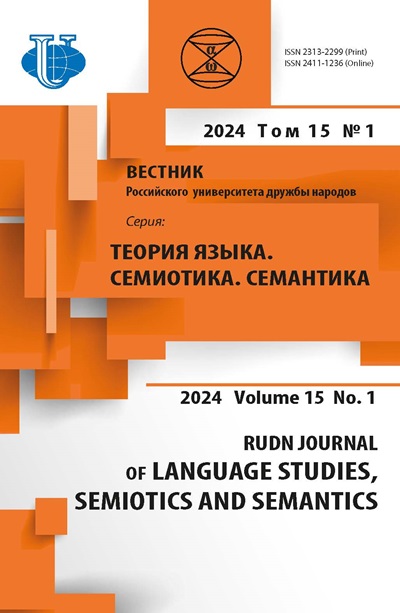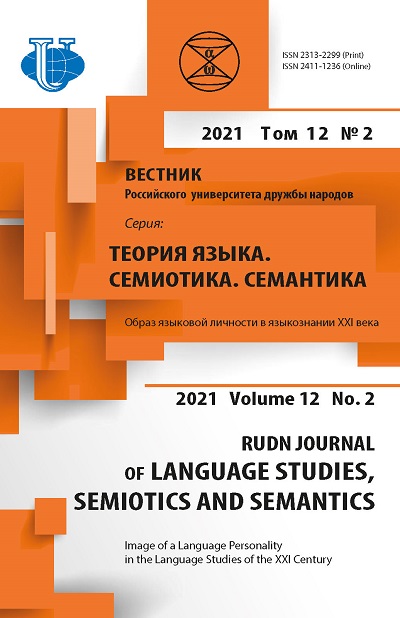Some Aspects of Author’s Phraseology of F.M. Dostoevsky
- Authors: Osokina E.A.1
-
Affiliations:
- Russian language institute of RAS
- Issue: Vol 12, No 2 (2021): Image of a Language Personality in the Language Studies of the XXI Century
- Pages: 417-435
- Section: INDIVIDUAL STYLE OF DOSTOEVSKY
- URL: https://journals.rudn.ru/semiotics-semantics/article/view/26755
- DOI: https://doi.org/10.22363/2313-2299-2021-12-2-417-435
Cite item
Full Text
Abstract
The article is devoted to the author’s phraseology of Dostoevsky, which characterizes him as an artist, a native speaker of the Russian language of his time and can distinguish him from other authors. Identification and characterization of the author’s phraseological units and author’s techniques of their creation on the example of the description of phraseological units to talk about the language creative personality and the features of the idiostyle. The systemic feature of the writer’s idiostyle when describing phraseology is an extraordinary variety in form, semantic shades and references to precedent texts, as well as a special property of the writer’s language - universality and originality, which allows you to go beyond the time frame of the writer’s work. The phraseological units introduced by Dostoevsky in the middle and second half of the XIX century entered the Russian language, they are recognizable and somehow present in the language of the XX and XXI centuries. To become stable expressions, it takes time for a more complete mastering of Dostoevsky’s texts, reproduction and consolidation of phraseological units in the language. Paradoxically, the unique, multidimensional and inimitable idiostyle of the writer can become an obstacle to entering the language. Moving on from century to century accumulate idioms of the language, and therefore people’s memory. The description of Dostoevsky’s phraseological units makes it possible to compare both different works of one writer and works of different authors in the synchrony and diachrony of the Russian language.
About the authors
Elena A. Osokina
Russian language institute of RAS
Author for correspondence.
Email: ruslang@ruslang.ru
Ph.D. philology, Research Fellow
18/2, Volkhonka str., Moscow, Russian Federation, 119019References
- Karaulov, Yu.N. (2004). Russian Language and Linguistic Personality. Moscow. (In Russ).
- Idiostyle In Vikipediya URL: https://ru.wikipedia.org/wiki/%D0%98%D0%B4%D0%B8% D0%BE%D1%81%D1%82%D0%B8%D0%BB%D1%8C (accessed: 21.09.2020). (In Russ).
- Baranov, A.N. & Dobrovol’skij, D.O. (2013). Fundamentals of Phraseology. Moscow: FLINTA: Nauka. (In Russ).
- Zhukov, A.V. (2009). Phraseological Phantoms in the Russian Language. Bulletin of the Novgorod State University, 51, 57—60. (In Russ).
- Ciczkun, V.V. & Morozova, T.V. (2017). The Problem of the Potentiality of Language: Potential Words and Potential Phraseological Units (to the history of the question). The humanitarian paradigm, 3, 5—13. URL: https://cyberleninka.ru/article/n/problema-potentsialnosti-yazyka-potentsialnye-slova-i-potentsialnye-frazeologizmy-k-istorii-voprosa (accessed: 24.01.2021). (In Russ).
- Russian Russian Dictionary-Thesaurus of Modern Russian Idioms: about 8,000 idioms of the modern Russian language (2007). A.N. Baranov, D.O. Dobrovol’skij (eds.). Moscow. URL: http://www.ruslang.ru/book_idiomatica08 (accessed: 14.01.21). (In Russ).
- National Corpus of the Russian Language) URL: http://www.ruscorpora.ru/search (accessed: 15.03.2019). (In Russ).
- Osokina, E.A. (2019). What became of Dostoevsky’s “people” In: V Summer Readings in Darovoye (“Dostoevsky and the People”), 26—28.08.2016, Zarajsk—Darovo. Kolomna: ID “Liga”, pp. 110—146. (In Russ).
- German Expletive or Italian Mushroom? Where did the word “potato” come from? Portal «Litinteres». URL: https://zen.yandex.ru/media/litinteres/nemeckoe-rugatelstvo-ili-italianskii-grib-otkuda-vzialos-slovo-kartofel-5cc1e5d83d89f500b3cec862 (accessed: 15.01.2021). (In Russ).
- The Origin of the Word POTATO) In Etymological online dictionaries of the Russian language URL: https://lexicography.online/etymology/%D0%BA/%D0%BA%D0%B0%D1%80%D1% 82%D0%BE%D1%84%D0%B5%D0%BB%D1%8C (accessed: 15.01.2021). (In Russ).
- Afanas’eva, E.M. (2013). Nomenologically Models in Artistic Practice: the Problem of Name Ontology. Modern problems of science and education, 5. URL: https://science-education.ru/ru/ article/view?id=10419 (accessed: 05.02.2021). (In Russ).
- The Ace of Diamonds In Dictionaries and encyclopedias on Akademik URL: https://dic.academic.ru/dic.nsf/michelson_new/795/%D0%B1%D1%83%D0%B1%D0%BD%D0%BE%D0%B2%D1%8B%D0%B9 (accessed: 10.02.2021). (In Russ).
- Shaxmatov, A.A. (1941). Syntax of the Russian Language. Leningrad: Uchpedgiz Narkomprosa RSFSR. (In Russ).
- Keep the style in Portal «Akademik» URL: https://fenya.academic.ru/1283/%D0%94%D0% B5%D1%80%D0%B6%D0%B0%D1%82%D1%8C_%D1%84%D0%B0%D1%81%D0%BE%D0%BD (accessed: 14.02.2021). (In Russ).
- A Dictionary of the Language of Dostoevsky. Idioglossarium (2008—2012). Yu.N. Karaulov (ed.). Moscow: AZBUKOVNIK. (In Russ).













